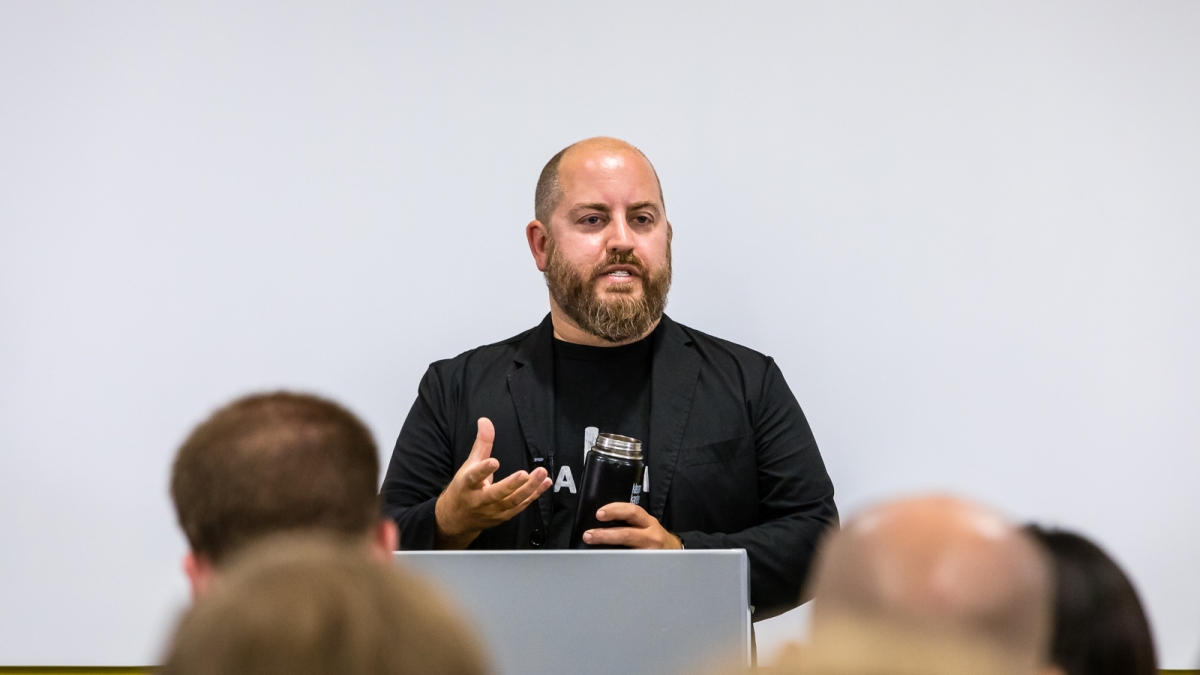Novelist imparts message of literary inclusivity to ASU students, faculty

Novelist Jess Row speaks at an event on Sept. 17 at The College of Liberal Arts and Sciences at ASU. Photo by Bruce Matsunaga
Representation and inclusivity in modern American fiction are essential components of honest, accurate writing, novelist Jess Row told a crowd of faculty, staff and students at Arizona State University.
The creative writing program at The College of Liberal Arts and Sciences hosted Row on Sept. 17 for a discussion and Q&A on his recent essay collection, “White Flights: Race, Fiction, and The American Imagination.”
“White Flights” — which was published in August by Gray Wolf Press — analyzes the effects of whiteness in the history of American literature, and is partly addressed to Row himself as a former creative writing student.
Row read an excerpt from an essay in “White Flights” that described the relationship between notable American short-story writer Raymond Carver and his editor, Gordon Lish.
“Essentially, the practice of writing that Lish has taught ever since the 1970s has to do with excising anything that culturally, historically or socially locates the individual,” he said. “The turn is away from thinking about a person’s social reality at all, to a kind of aphasic representation of thoughts or actions as happening in this very empty space.”
According to Row, one of the culprits of this literary trend is the modern incubator of academic creative writing: the workshop.
“It became clear to me, after taking multiple creative writing workshops, that this idea that you’re supposed to be constantly looking for ways to cut your work down was a kind of shame-based methodology,” he said. “You have to ask, ‘What is it about this work ethic of always reducing, reducing, reducing’ — what is that really perpetuating?”
To Row, the reduction of cultural details in creative writing represents an attempt by mostly white authors to “other-ize” people of different social and racial backgrounds.
“Oftentimes in the writing workshop, what’s essentially meant by doing this is stripping away cultural context,” he said. “Anything that locates the story in a particular linguistic community or ethnic community — all of that is the material that’s supposed to be excised.”
Matt Bell, the facilitator of the event and director of creative writing at ASU, said literary communities at ASU haven’t yet had the kind of conversations about race Row initiated.
“Race is obviously an important subject in America and in writing, and we often don’t talk about it through the lens of whiteness and how white writers write about race,” he said. “I’m hoping that this is a conversation that we haven’t had as much as we could, and that this is a chance to begin or further that in different ways.”
Bell stressed the importance of lineages when it comes to creative writing, and that mentor relationships with their mentees can often perpetuate the style of writing Row discussed.
“Jess was talking about the way he was taught as a writer,” he said. “Some of the people he mentioned taught or influenced me, and so in some ways, it’s thinking about what we want to pass on as teachers or what we don’t want to pass on.”
Tara Ison, an attendee of Row’s speech and a professor of English at ASU, said Row “makes me question my own privilege.”
“As a woman, I'd always read Carver through the lens of gender, not race,” she said. “Listening to Jess Row, I’m grateful for him giving me the three-dimensional-ness of this issue.”
Until hearing Row speak, Ison said she’d previously noted the isolating aspects of Carver’s writing style as opposed to its racial imbalance.
“I’m white, so it’s easy for me not to think about the ‘whiteness’ of it,” she said. “But Jess's writing makes me want to revisit my relationships with other writers, and my own privilege, that I haven’t looked at enough. He’s keeping me on my toes — on my white toes — in a way that I need to be.”
More Arts, humanities and education

ASU alum's humanities background led to fulfilling job with the governor's office
As a student, Arizona State University alumna Sambo Dul was a triple major in Spanish, political science and economics. After…

ASU English professor directs new Native play 'Antíkoni'
Over the last three years, Madeline Sayet toured the United States to tell her story in the autobiographical solo-…

ASU student finds connection to his family's history in dance archives
First-year graduate student Garrett Keeto was visiting the Cross-Cultural Dance Resources Collections at Arizona State University…